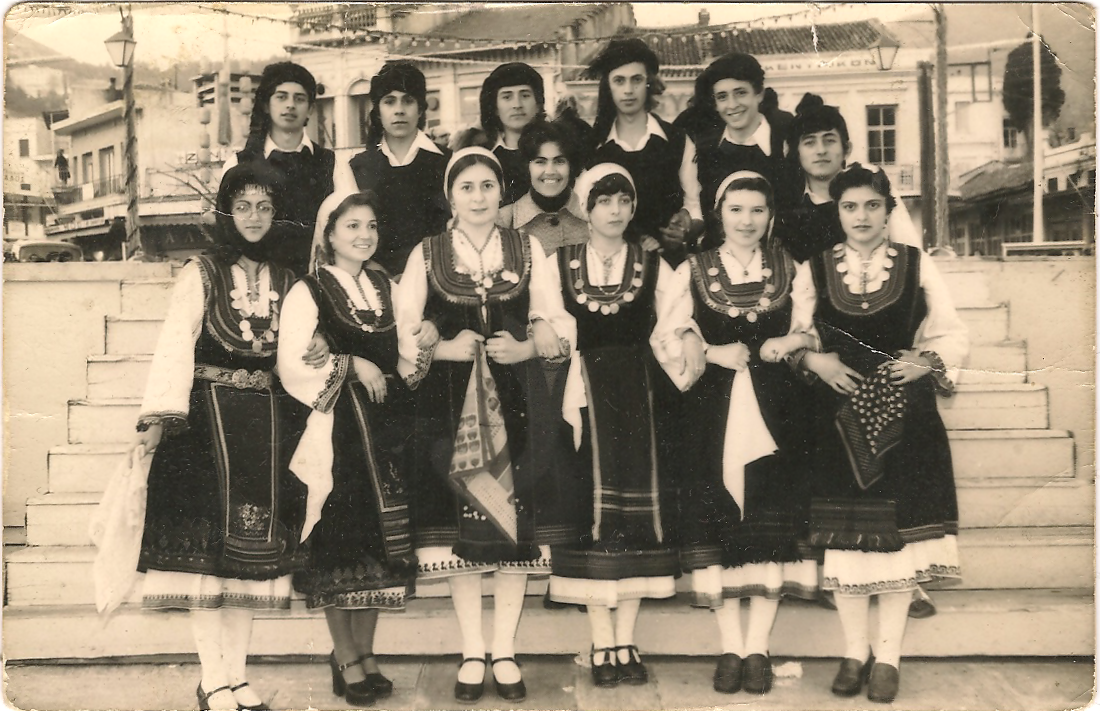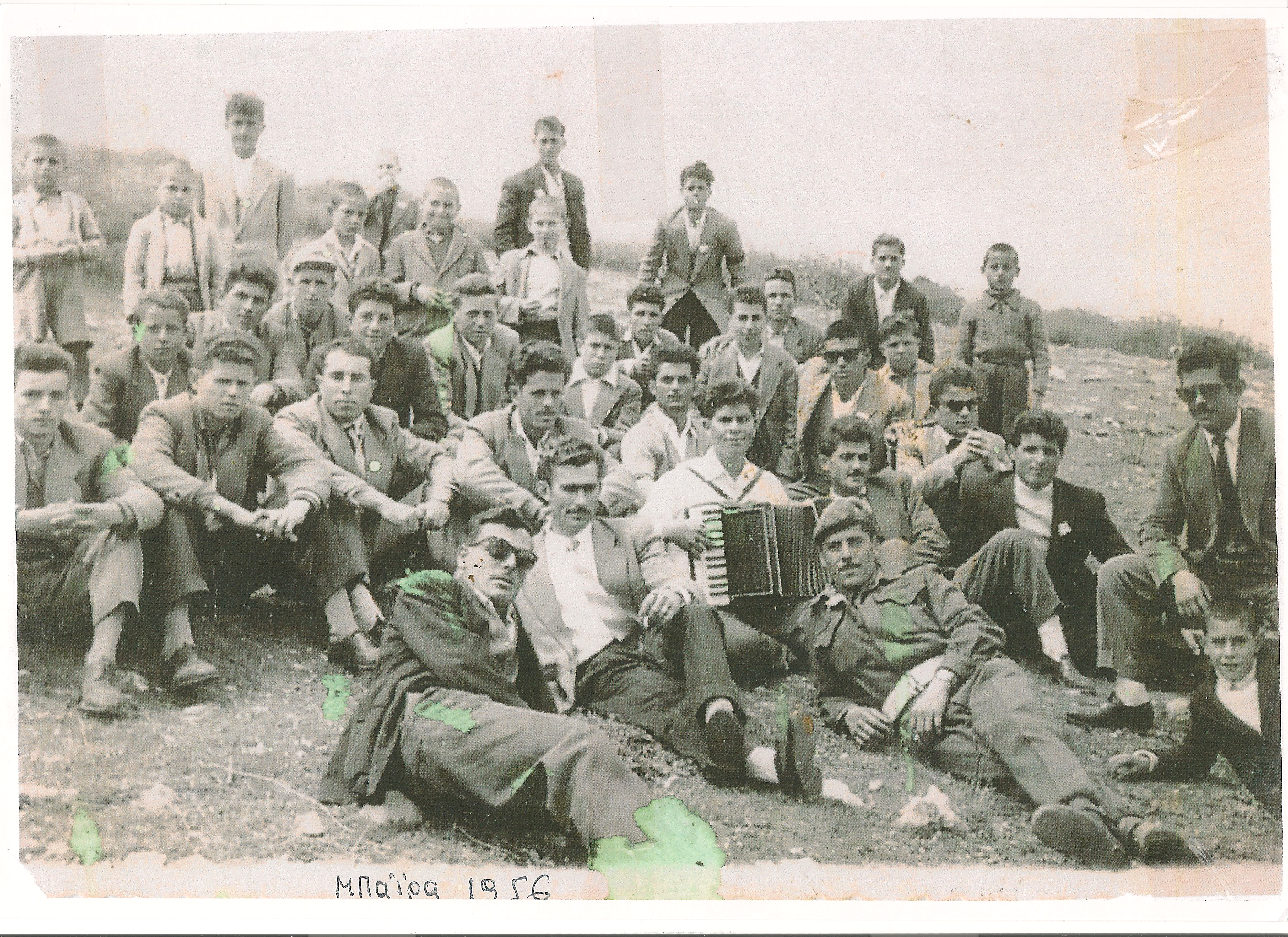Customary Law
Histoy of Nea Kessani
 Photo of the youth of the cultural association (from left): Vathrakeas Christos, Dafos Thomas, Tsilingiris Giannis, Paraskevas Sakis, Papantoniou Antonis, Tsamourtzis Fotis and Gaitani Fotini, Georgopoulou Dimitra, Eleftheriou Afentia, Nikolaou Sofia, Tsilingiri Giannoula, Tsilingiri Georgia. Their teacher: Karakatsani Sofoula.
Photo of the youth of the cultural association (from left): Vathrakeas Christos, Dafos Thomas, Tsilingiris Giannis, Paraskevas Sakis, Papantoniou Antonis, Tsamourtzis Fotis and Gaitani Fotini, Georgopoulou Dimitra, Eleftheriou Afentia, Nikolaou Sofia, Tsilingiri Giannoula, Tsilingiri Georgia. Their teacher: Karakatsani Sofoula.
Distinction of social classes: In our case, we had a distinction between social groups, because our village was inhabited by farmers and shepherds, all of them refugees, so there was no issue of social classes. The distinction was made between refugees from Eastern Thrace and Eastern Rumelia. The former were called Thrakiotes, the latter Bourgarites. The animosity between the two groups was well known from the beginning of their coexistence, which, over time, was smoothed out, but it left its marks on the elderly. They celebrated separately, and it was forbidden for anyone to take part in the dances of the other group. For example, when Thracian girls went to the dance of the Eastern Rumelians, the mothers came out with sticks and chased them home, while the Rumelians used to speak disparagingly of the Thracians. The first marriages between them, of course, happened in the 1930s, such as that of Dimitris and Eleni Tsamourtzis from Katikioi and Agios Vlassis respectively, but the animosity continued, although without creating particular problems.
Social relations and etiquette:
- Sincere solidarity and spontaneous, carefree and almost daily celebrations were once the main characteristics of life in Nea Kessani. At these gatherings, people would rest from the day’s labor, enjoy themselves, and arrange marriages. It was also a good way for villagers to communicate and bond. Very often, people from other villages and from Xanthi also participated, because such celebrations with such wine did not happen elsewhere. Solidarity and a sincere willingness to help have always been characteristic of our village. They built their houses together, in harmonious cooperation. Major agricultural tasks such as threshing and grape harvesting were also carried out together, and no one was left to struggle alone. The women faced every daily challenge with the support of one another. At major life events—weddings, births, deaths—the whole village participated wholeheartedly. The misery of loneliness that haunts modern society had no place in our village, because sociability was a need and, above all, a joy.
- Every evening the women held “nychteri”, where many neighbors gathered at someone’s house at sunset. They would embroider, spin, knit, clean legumes, corn, etc., working on whatever was needed, and as they talked, the work became more pleasant and quicker. They left their shoes at the front door. Treats included carobs, tsat-pat, roasted chickpeas, fritters, halva made with flour. The songs and stories were a matter of inspiration or mood, not a regular habit. Favorites were the “masalia”, stories of everyday life or from the distant past, which were funny or conveyed traditions. Men never attended the nychteria, except when there were very few women, and even then they stayed only briefly.
- The dining table is considered sacred and a duty toward guests. It’s no coincidence that every celebration, anniversary, joyful occasion, or sorrowful moment like death was (and still is) accompanied by a “trapezoma” (communal meal). It is an insult not to treat a relative, friend, or visitor with whatever the household has. If someone arrives and finds the family at the table, they say “his mother-in-law loves him.” A strong bond of friendship and mutual respect is created between those who have dined together. The Northern Thracians never ate if they arrived at a house and found the family at the table, because they thought they’d be seen as “gliarka,” meaning gluttons. They also never entered a house without knocking. On the other hand, the Eastern Thracians were more spontaneous and would enter a friendly home without waiting for formal invitations and weren’t ashamed to accept a snack, since they themselves considered it essential to offer something to anyone who came over.
- The elderly, priests, and those of high social standing are worthy of respect. Children have the duty to care for and look after their parents when they can no longer care for themselves. In greeting them, they kiss their hand and bring it to their forehead. Their opinion is important, and their presence is highly respected. It is an honor for someone to be visited by the priest and especially the village president. When a priest passes by, children run to kiss his hand and receive a blessing, while adults stand up because he bears the image of Christ.
In the past, children were not supposed to speak in front of elders as a sign of respect. It was unacceptable to be rude or provocative toward adults; if they did, they were stigmatized. When encountering adults, they wouldn’t block their path and would stand up when an older person entered the room. Before taking communion, everyone (including adults) kissed the hands of their elders and said “Forgive me.” All these rules also applied to a daughter-in-law’s behavior toward her in-laws.
Hospitality: The residents of Nea Kessani can rightfully be proud that they fully live up to the reputation of Greeks as hospitable people. Every stranger can find shelter and the best treatment in our village. The reception of guests is a special time for the household, and everything is prepared to be perfect. Even when someone visits unexpectedly, they offer whatever the house has, even if it’s just olives, ouzo, and bread.
The family and relationships between its members: The family is patriarchal; the father is the head and cornerstone of the household. Nowadays, the woman’s role is recognized, especially for working women, but in the past, it was not. The husband refers to his wife as “woman” or by her name; the wife calls him “man” or by name, and to others refers to him as “our father,” “my husband,” or “mine,” while he says “my wife” or “mine.” The wife had to be modest, dignified, hardworking, a good homemaker, and respect her husband absolutely. Divorce was not an option in the past. Both spouses owed respect to each other’s parents, but especially the daughter-in-law had to respect and obey her in-laws without question. She addressed them as “mother” and “father” and stood when the father-in-law entered or left the room. The bride’s mother was not allowed to interfere in the couple’s affairs, while the groom’s mother could. Children have always been required to show respect and obedience to their parents. The firstborn son was the pride of the family, but I believe our villagers have always been fair in their love for all their children. The firstborn did not hold the heavy significance he had in other parts of Greece, and girls were equally welcome. Children were considered adults after the age of twenty.

